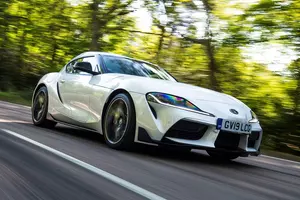
| Vehicle | Precise engine size | Difference from world average | Engine size to consumption ratio | Horsepower from 1 L | Engine size to 100 kg of weight |
|---|---|---|---|---|---|
| 2.0 |
2 L (1998 cc) |
14.8% smaller | - | 99 hp from 1 L | 143 cc to 100 kg |
| GR 3.0 |
3 L (2998 cc) |
27.8% bigger | 91 cc to 1 mpg | 113 hp from 1 L | 200 cc to 100 kg |
| GR 2.0 |
2 L (1998 cc) |
14.8% smaller | - | 129 hp from 1 L | 143 cc to 100 kg |
| Vehicle | 2.0 |
|---|---|
| Precise engine size | 2 L (1998 cc) |
| Difference from world average | 14.8 smaller |
| Engine size to consumption ratio | - |
| Horsepower from 1 L | 99 hp from 1 L |
| Engine size to 100 kg of weight | 143 cc to 100 kg |
| Vehicle | GR 3.0 |
| Precise engine size | 3 L (2998 cc) |
| Difference from world average | 27.8 bigger |
| Engine size to consumption ratio | 91 cc to 1 mpg |
| Horsepower from 1 L | 113 hp from 1 L |
| Engine size to 100 kg of weight | 200 cc to 100 kg |
| Vehicle | GR 2.0 |
| Precise engine size | 2 L (1998 cc) |
| Difference from world average | 14.8 smaller |
| Engine size to consumption ratio | - |
| Horsepower from 1 L | 129 hp from 1 L |
| Engine size to 100 kg of weight | 143 cc to 100 kg |

| Vehicle | Precise engine size | Difference from world average | Engine size to consumption ratio | Horsepower from 1 L | Engine size to 100 kg of weight |
|---|---|---|---|---|---|
| 3.0i 24V |
3 L (2997 cc) |
27.7% bigger | - | 75 hp from 1 L | 214 cc to 100 kg |
| 3.0i 24V T-turbo |
3 L (2997 cc) |
27.7% bigger | 143 cc to 1 mpg | 110 hp from 1 L | 187 cc to 100 kg |
| 3.0i 24V Turbo |
3 L (2997 cc) |
27.7% bigger | 143 cc to 1 mpg | 93 hp from 1 L | 200 cc to 100 kg |
| Vehicle | 3.0i 24V |
|---|---|
| Precise engine size | 3 L (2997 cc) |
| Difference from world average | 27.7 bigger |
| Engine size to consumption ratio | - |
| Horsepower from 1 L | 75 hp from 1 L |
| Engine size to 100 kg of weight | 214 cc to 100 kg |
| Vehicle | 3.0i 24V T-turbo |
| Precise engine size | 3 L (2997 cc) |
| Difference from world average | 27.7 bigger |
| Engine size to consumption ratio | 143 cc to 1 mpg |
| Horsepower from 1 L | 110 hp from 1 L |
| Engine size to 100 kg of weight | 187 cc to 100 kg |
| Vehicle | 3.0i 24V Turbo |
| Precise engine size | 3 L (2997 cc) |
| Difference from world average | 27.7 bigger |
| Engine size to consumption ratio | 143 cc to 1 mpg |
| Horsepower from 1 L | 93 hp from 1 L |
| Engine size to 100 kg of weight | 200 cc to 100 kg |

| Vehicle | Precise engine size | Difference from world average | Engine size to consumption ratio | Horsepower from 1 L | Engine size to 100 kg of weight |
|---|---|---|---|---|---|
| 3.0 Turbo |
3 L (2997 cc) |
27.7% bigger | 136 cc to 1 mpg | 110 hp from 1 L | 187 cc to 100 kg |
| Vehicle | 3.0 Turbo |
|---|---|
| Precise engine size | 3 L (2997 cc) |
| Difference from world average | 27.7 bigger |
| Engine size to consumption ratio | 136 cc to 1 mpg |
| Horsepower from 1 L | 110 hp from 1 L |
| Engine size to 100 kg of weight | 187 cc to 100 kg |